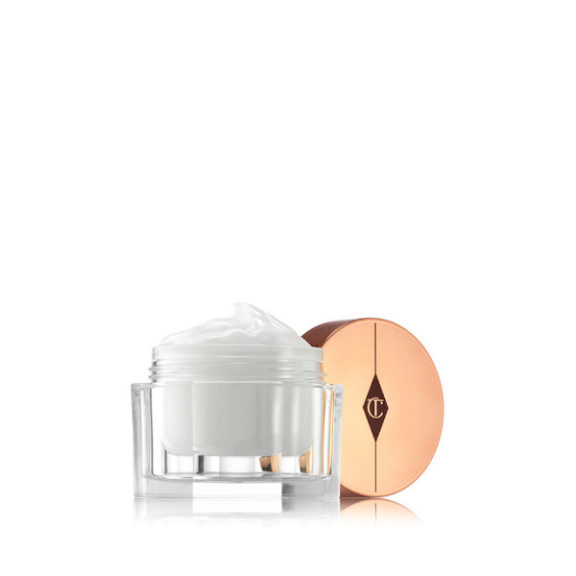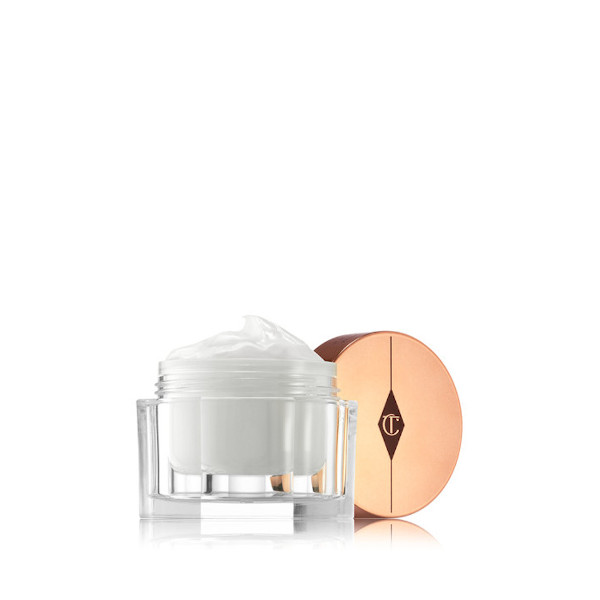Charlotte’s Magic Cream
Expert Review
Charlotte’s Magic Cream is a best-selling moisturizer from Charlotte Tilbury. We will have a closer look at its ingredients, claims, and evidence behind the claims.
Cosmetic Claims
This moisturizer is covered in superlatives. We found distinct claims about its performance. The website says that the claims are based on a clinical study. We could not find any publicly available information about this study. When we approached Charlotte Tilbury to share this information with the public. However, the company declined to comment.
-
100% felt their skin was instantly moisturised
-
100% agree dull skin was instantly transformed
-
98% agree skin looked and felt firmer
-
96% agrees skin looks and feels plumper
-
Moisturizes for up to 24 hours
-
Creates the PERFECT base for makeup
-
INSTANTLY makes (your skin) appear:
-
a) Plumper
-
b) Smoother
-
c) Brighter
Legend
Ingredient review and safety:
Next, we looked at the ingredients of this popular moisturizer. It has a remarkably high proportion of ingredients that have emollient and skin conditioning properties (such as C12-15 Alkyl Benzoate, Glyceryl Stearate SE, Butylene Glycol, and Glycerin). Based on a high proportion of these ingredients, the claim that helps skin appear plumper and smoother can be supported. The claim that it “INSTANTLY” makes skin appear brighter cannot be supported. Although there are antioxidants in the cream (such as vitamins C and E), their brightening effect would be seen over time, with the skin turnover-not immediately. We could also not find any ingredients that would work as a foundation to make skin appear brighter, either. The claim that this cream is a “PERFECT” base for makeup would also need some evidence-such as testing the opinion of users. Five out of nine claims are based on a specific timeframe (24 hours) or to a percentage (%) of users trying the product. To confirm if they hold true, these claims would need to be supported with study evidence.
Aqua/Water/Eau, C12-15 Alkyl Benzoate, Glyceryl Stearate Se, Butylene Glycol, Glycerin, Olus Oil/Vegetable Oil/Huile Végétale, Isononyl Isononanoate, Cetyl Alcohol, Ethylhexyl Palmitate, Cyclopentasiloxane, Dimethicone, Polyester-7, Phenoxyethanol, Neopentyl Glycol Diheptanoate, Butyrospermum Parkii (Shea) Butter, Steareth-21, Avena Sativa (Oat) Kernel Extract, Carbomer, Dimethiconol, Potassium Cetyl Phosphate, Chlorphenesin, Caprylyl Glycol, Xanthan Gum, Hydrolyzed Viola Tricolor Extract, Allantoin, Aloe Barbadensis Leaf Juice, Disodium EDTA, Tocopheryl Acetate, Camellia Oleifera Seed Oil, Rosa Canina Fruit Oil, Rosa Damascena Extract, Sodium Hydroxide, Helianthus Annuus (Sunflower) Seed Oil, Michelia Alba Leaf Oil, Sodium Lactate, Coco-Glucoside, Peg-8, Ethylhexylglycerin, Sodium Hyaluronate, Tocopherol, Palmitoyl Tetrapeptide-7, Palmitoyl Tripeptide-1, Ascorbyl Palmitate, Plumeria Rubra Flower Extract, Ascorbic Acid, Citric Acid, Nicotiana Sylvestris Leaf Cell Culture, Linalool, Citronellol, Geraniol.
Allergen free?

Linalool
Citronellol
Geraniol
Maximum concentrations do not exceed use guidelines?
Preservative free?

Phenoxyethanol
Chlorphenesin
Maximum concentrations do not exceed use guidelines?
EU restricted ingredient free?

Sodium Hydroxide
Maximum concentrations do not exceed use guidelines?
This moisturizer contains three ingredients that are known as fragrance allergens/dermal sensitizers. Linalool, Citronellol, and Geraniol known sensitizer, and in the EU are classified as fragrance allergens, causing allergic reactions in some individuals who are sensitive to it. IFRA recommends restriction of Linalool and limiting Citronellol to a maximum of 13% for eye creams and 3.2% for facial moisturizers. IFRA also recommends limiting Geraniol to a maximum of 5.1% for eye creams and 1.2% for facial moisturizers.
Phenoxyethanol is a preservative that is considered safe to use in concentrations of up to 1%. Chlorphenesin is a preservative, which can prevent the growth of microorganisms. It is considered safe when used in cosmetics in the concentrations of up to 0.3%. Phenoxyethanol is quite high up on the ingredient list. This could mean that its concentration is more than 1% or that the concentration of other ingredients following it on the list is at 1% or lower. The same logic goes for Chlorphenesin, which is limited to a concentration of 0.3%.
Sodium Hydroxide is used to stabilize the pH in cosmetics. Sodium Hydroxide falls on the list of ingredients restricted to use in Europe, as it has shown to cause skin irritation at concentrations 0.5% and higher and be corrosive at concentrations above 2%.
As Charlote Tilburry’s team declined to comment, we do not know whether they have followed these common safety guidelines for their US-marketed products.
Conclusions

Pros
- Ingredients suggest that it might help skin appear plumper and smoother.
Cons
- Charlotte Tilbury’s team is unwilling to share with the consumer any evidence of clinical studies that would support the claims they make about this moisturizer.
- Listed ingredients contain known fragrance allergens, preservatives, and ingredients subject to maximum allowed concentration guidelines. We could not confirm if the preservatives listed here follow the common safety guidelines and to what extent.

